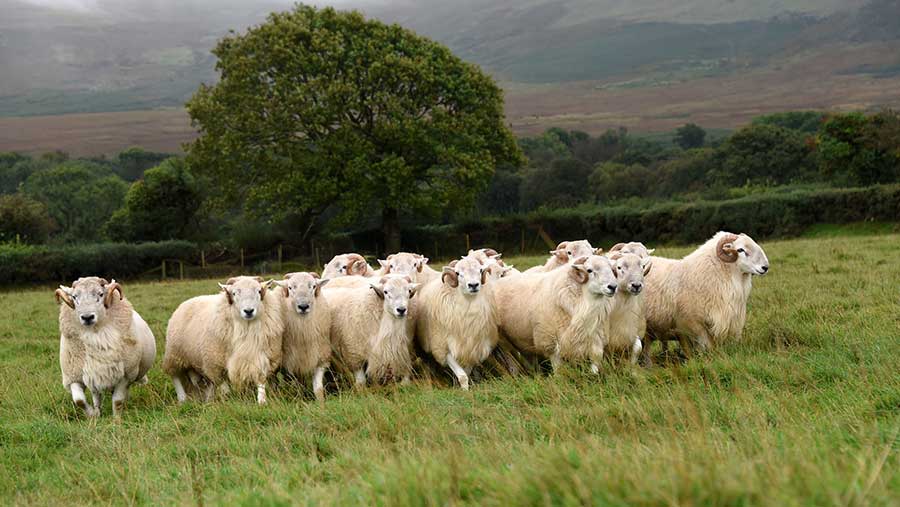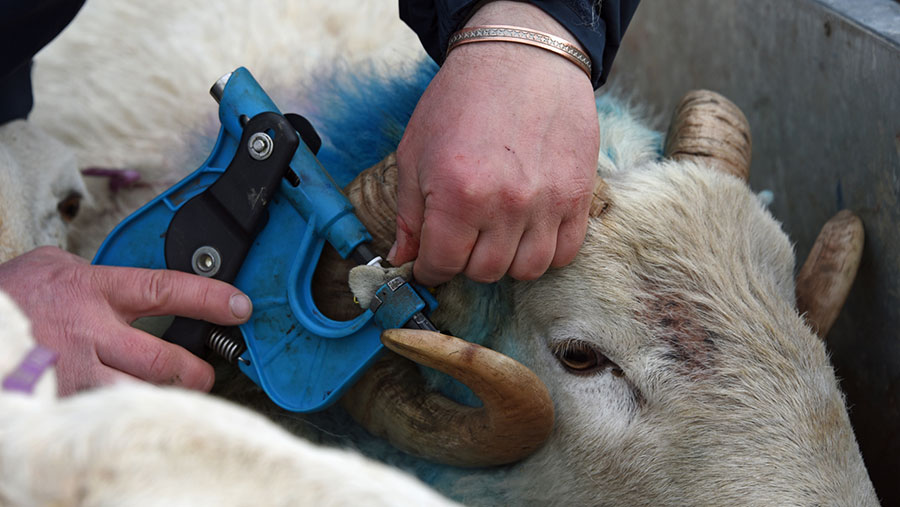Advertiser content
Wales leads the world with new genomic breeding data
 A hill-ram-scheme flock © Hybu Cig Cymru
A hill-ram-scheme flock © Hybu Cig Cymru The use of genomic breeding values is well-established in the dairy sector and developing quickly in the beef industry but has not been prevalent in UK sheep sector, until now.
Sheep genomics can play an important role in identifying and selecting livestock for mating with the best genetics for specific breeding objectives, such as ewe longevity, maternal ability, lamb weights and meat quality.
Wales is now leading the way, worldwide, in developing genomic breeding values in the hill sheep sector.
Using a uniquely large DNA database from Welsh sheep, the information has been gathered during the Hill Ram Scheme – a five year project delivered by Hybu Cig Cymru – Meat Promotion Wales (HCC).
Funded through the Welsh government and EU Rural Development Programme, a feasibility study was conducted showing that genetic links between flocks shows genetic merits that are relative to the wider recorded sheep population.
This offers breeders increased accuracy and confidence in genetics.
Genomic estimated breeding values (GEBVs) are used in the same way as non-genomic breeding values and contribute to the breeding index used to buy and sell livestock developed for hill sheep.

Tissue sampling as part of the data collection process © Hybu Cig Cymru
John Richards, Hybu Cig Cymru producer and processor lead said: “The use of genomic breeding values is well established in the dairy sector and developing quickly in the beef industry. However, this has not been the case for the UK sheep sector.
“We are excited to be leading this ground-breaking work within the sheep sector, here in Wales.
“The Hill Ram scheme has already explored the feasibility of developing genomic breeding values in hill sheep which will support our key priorities of farming in a sustainable and effective way.”
One way farmers will look to enhance breeding evaluations will be to move away from making predictions about genes thought to be inherited by an animal and use genomic information to share the actual genes it possesses.
John Richards continued: “As part of the Hill Ram Scheme, 50 farmers participated in the feasibility project taking tissue samples from lambs, ewes and rams to extract DNA sequences (genotypes) in order to determine the parentage of lambs.
“While these genotypes allow verification of parentage and show individual genes that may have a large impact on performance, they can also be used to inform breeding evaluations around thousands of tiny genetic variations on DNA strands that, when combined, contribute to the overall genetic merit of the animal.”
Genomic information can provide a wealth of intelligence and information, but it is particularly useful for traits which take a long time to be assessed, such as ewe longevity, traits expressed through females and traits that are very expensive to record, such as meat quality.
HCC’s Hill Ram Scheme has been a five-year initiative to empower hill farmers and breeders to access genetic information through the latest DNA recording technology.
This has enabled performance recording to proceed without disrupting their hill management systems by allowing the detection of parentage by matching the DNA of the ram, the ewe and the lambs.
Part of the wider Red Meat Development Programme funded through the Welsh government and EU Rural Development Programme, the project’s fundamental aim has been to encourage the use of data and genetics for hill farmers and breeders to make informed decisions about their flocks.
“We now look forward to seeing how this legacy continues and further informs the wider sheep sector here in Wales.”
To find out more, visit meatpromotion.wales
Provided by
Hybu Cig Cymru – Meat Promotion Wales (HCC) is the organisation responsible for the development, promotion and marketing of Welsh red meat.
For the last 5 years, HCC has delivered the Red Meat Development Programme, a strategic initiative aimed to improve profitability and sustainability in the red meat supply chain. The three projects within the Programme are Stoc+, the Hill Ram Scheme and the Welsh Lamb Meat Quality Project.
HCC also works to promote Welsh red meat and develop new markets at home and abroad. It also supports the industry through research and development, information dissemination and support and training throughout the supply chain.
To find out more:
Call: 01970 625050
Email: info@hybucig.cymru
Visit: meatpromotion.wales/en/industry-projects/red-meat-development-programme
